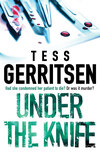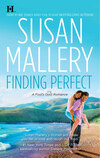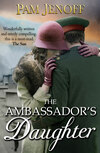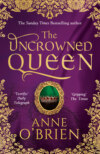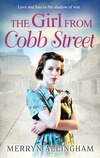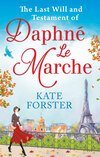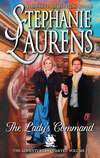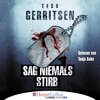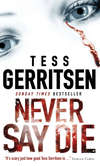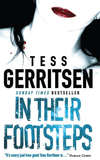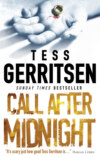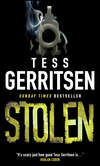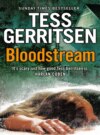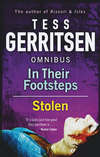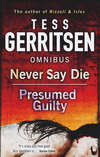Kitabı oku: «Under The Knife», sayfa 3
CHAPTER THREE
YOU DON’T HAVE a snowball’s chance in hell.
That was the phrase Kate kept hearing over and over as she sat alone at a table in the hospital cafeteria. And just how long did it take for a snowball to melt, anyway? Or would it simply disintegrate in the heat of the flames?
How much heat could she take before she fell apart on the witness stand?
She’d always been so adept at dealing with matters of life and death. When a medical crisis arose, she didn’t wring her hands over what needed to be done; she just did it, automatically. Inside the safe and sterile walls of the operating room, she was in control.
But a courtroom was a different world entirely. That was David Ransom’s territory. He’d be the one in control; she’d be as vulnerable as a patient on the operating table. How could she possibly fend off an attack by the very man who’d built his reputation on the scorched careers of doctors?
She’d never felt threatened by men before. After all, she’d trained with them, worked with them. David Ransom was the first man who’d ever intimidated her, and he’d done it effortlessly. If only he was short or fat or bald. If only she could think of him as human and therefore vulnerable. But just the thought of facing those cold blue eyes in court made her stomach do a panicky flip-flop.
“Looks like you could use some company,” said a familiar voice.
Glancing up, she saw Guy Santini, rumpled as always, peering down at her through those ridiculously thick glasses.
She gave him a listless nod. “Hi.”
Clucking, he pulled up a chair and sat down. “How’re you doing, Kate?”
“You mean except for being unemployed?” She managed a sour laugh. “Just terrific.”
“I heard the old man pulled you out of the O.R. I’m sorry.”
“I can’t really blame it on old Avery. He was just following orders.”
“Bettencourt’s?”
“Who else? He’s labeled me a financial liability.”
Guy snorted. “That’s what happens when the damned M.B.A.’s take over. All they can talk about is profits and losses! I swear, if George Bettencourt could make a buck selling the gold out of patients’ teeth, he’d be roaming the wards with pliers.”
“And then he’d send them a bill for oral surgery,” Kate added morosely.
Neither of them laughed. The joke was too close to the truth to be funny.
“If it makes you feel any better, Kate, you’ll have some company in the courtroom. I’ve been named, too.”
She looked up sharply. “Oh, Guy! I’m sorry….”
He shrugged. “It’s no big deal. I’ve been sued before. Believe me, it’s that first time that really hurts.”
“What happened?”
“Trauma case. Man came in with a ruptured spleen and I couldn’t save him.” He shook his head. “When I saw that letter from the attorney, I was so depressed I wanted to leap out the nearest window. Susan was ready to drag me off to the psych ward. But you know what? I survived. So will you, as long as you remember they’re not attacking you. They’re attacking the job you did.”
“I don’t see the difference.”
“And that’s your problem, Kate. You haven’t learned to separate yourself from the job. We both know the hours you put in. Hell, sometimes I think you practically live here. I’m not saying dedication’s a character flaw. But you can overdo it.”
What really hurt was that she knew it was true. She did work long hours. Maybe she needed to; it kept her mind off the wasteland of her personal life.
“I’m not completely buried in my job,” she said. “I’ve started dating again.”
“It’s about time. Who’s the man?”
“Last week I went out with Elliot.”
“That guy from computer programming?” He sighed. Elliot was six-foot-two and one hundred and twenty pounds, and he bore a distinct resemblance to Pee-Wee Herman. “I bet that was a barrel of laughs.”
“Well it was sort of…fun. He asked me up to his apartment.”
“He did?”
“So I went.”
“You did?”
“He wanted to show me his latest electronic gear.”
Guy leaned forward eagerly. “What happened?”
“We listened to his new CDs. Played a few computer games.”
“And?”
She sighed. “After eight rounds of Zork I went home.”
Groaning, Guy sank back in his chair. “Elliot Lafferty, last of the red-hot lovers. Kate, what you need is one of these dating services. Hey, I’ll even write the ad for you. ‘Bright, attractive female seeks—’”
“Daddy!” The happy squeal cut straight through the cafeteria’s hubbub.
Guy turned as running feet pattered toward him. “There’s my Will!” Laughing, he rose to his feet and scooped up his son. It took only a sweep of his arms to send the spindly five-year-old boy flying into the air. Little Will was so light he seemed to float for a moment like a frail bird. He fell to a very soft, very safe landing in his father’s arms. “I’ve been waiting for you, kid,” Guy said. “What took you so long?”
“Mommy came home late.”
“Again?”
Will leaned forward and whispered confidentially. “Adele was really mad. Her boyfriend was s’posed to take her to the movies.”
“Uh-oh. We certainly don’t want Adele to be mad at us, do we?” Guy flashed an inquiring look at his wife Susan, who was threading her way toward them. “Hey, are we wearing out the nanny already?”
“I swear, it’s that full moon!” Susan laughed and shoved back a frizzy strand of red hair. “All my patients have gone absolutely loony. I couldn’t get them out of my office.”
Guy muttered grumpily to Kate, “And she swore it’d be a part-time practice. Ha! Guess who gets called to the E.R. practically every night?”
“Oh, you just miss having your shirts ironed!” Susan reached up and gave her husband an affectionate pat on the cheek. It was the sort of maternal gesture one expected of Susan Santini. “My mother hen,” Guy had once called his wife. He’d meant it as a term of endearment and it had fit. Susan’s beauty wasn’t in her face, which was plain and freckled, or in her figure, which was as stout as a farm wife’s. Her beauty lay in that serenely patient smile that she was now beaming at her son.
“Daddy!” William was prancing like an elf around Guy’s legs. “Make me fly again!”
“What am I, a launching pad?”
“Up! One more time!”
“Later, Will,” said Susan. “We have to pick up Daddy’s car before the garage closes.”
“Please!”
“Did you hear that?” Guy gasped. “He said the magic word.” With a lion’s roar, Guy pounced on the shrieking boy and threw him into the air.
Susan gave Kate a long-suffering look. “Two children. That’s what I have. And one of them weighs two hundred and forty pounds.”
“I heard that.” Guy reached over and slung a possessive arm around his wife. “Just for that, lady, you have to drive me home.”
“Big bully. Feel like McDonald’s?”
“Humph. I know someone who doesn’t want to cook tonight.”
Guy gave Kate a wave as he nudged his family toward the door. “So what’ll it be, kid?” Kate heard him say to William. “Cheeseburger?”
“Ice cream.”
“Ice cream. Now that’s an alternative I hadn’t thought of….”
Wistfully Kate watched the Santinis make their way across the cafeteria. She could picture how the rest of their evening would go. She imagined them sitting in McDonald’s, the two parents teasing, coaxing another bite of food into Will’s reluctant mouth. Then there’d be the drive home, the pajamas, the bedtime story. And finally, there’d be those skinny arms, curling around Daddy’s neck for a kiss.
What do I have to go home to? she thought.
Guy turned and gave her one last wave. Then he and his family vanished out the door. Kate sighed enviously. Lucky man.
* * *
AFTER HE LEFT his office that afternoon, David drove up Nuuanu Avenue and turned onto the dirt lane that wound through the old cemetery. He parked his car in the shade of a banyan tree and walked across the freshly mown lawn, past the marble headstones with their grotesque angels, past the final resting places of the Doles and the Binghams and the Cookes. He came to a section where there were only bronze plaques set flush in the ground, a sad concession to modern graveskeeping. Beneath a monkeypod tree, he stopped and gazed down at the marker by his feet.
Noah Ransom
Seven Years Old
It was a fine spot, gently sloping, with a view of the city. Here a breeze was always blowing, sometimes from the sea, sometimes from the valley. If he closed his eyes, he could tell where the wind was coming from, just by its smell.
David hadn’t chosen this spot. He couldn’t remember who had decided the grave should be here. Perhaps it had simply been a matter of which plot was available at the time. When your only child dies, who cares about views or breezes or monkeypod trees?
Bending down, he gently brushed the leaves that had fallen on the plaque. Then, slowly, he rose to his feet and stood in silence beside his son. He scarcely registered the rustle of the long skirt or the sound of the cane thumping across the grass.
“So here you are, David,” called a voice.
Turning, he saw the tall, silver-haired woman hobbling toward him. “You shouldn’t be out here, Mother. Not with that sprained foot.”
She pointed her cane at the white clapboard house sitting near the edge of the cemetery. “I saw you through my kitchen window. Thought I’d better come out and say hello. Can’t wait around forever for you to come visit me.”
He kissed her on the cheek. “Sorry. I’ve been busy. But I really was on my way to see you.”
“Oh, naturally.” Her blue eyes shifted and focused on the grave. It was one of the many things Jinx Ransom shared with her son, that peculiar shade of blue of her eyes. Even at sixty-eight, her gaze was piercing. “Some anniversaries are better left forgotten,” she said softly.
He didn’t answer.
“You know, David, Noah always wanted a brother. Maybe it’s time you gave him one.”
David smiled faintly. “What are you suggesting, Mother?”
“Only what comes naturally to us all.”
“Maybe I should get married first?”
“Oh, of course, of course.” She paused, then asked hopefully: “Anyone in mind?”
“Not a soul.”
Sighing, she laced her arm through his. “That’s what I thought. Well, come along. Since there’s no gorgeous female waiting for you, you might as well have a cup of coffee with your old mother.”
Together they crossed the lawn toward the house. The grass was uneven and Jinx moved slowly, stubbornly refusing to lean on her son’s shoulder. She wasn’t supposed to be on her feet at all, but she’d never been one to follow doctors’ orders. A woman who’d sprained her ankle in a savage game of tennis certainly wouldn’t sit around twiddling her thumbs.
They passed through a gap in the mock-orange hedge and climbed the steps to the kitchen porch. Gracie, Jinx’s middle-aged companion, met them at the screen door.
“There you are!” Gracie sighed. She turned her mouse-brown eyes to David. “I have absolutely no control over this woman. None at all.”
He shrugged. “Who does?”
Jinx and David settled down at the breakfast table. The kitchen was a dense jungle of hanging plants: asparagus fern and baby’s tears and wandering Jew. Valley breezes swept in from the porch, and through the large window, there was a view of the cemetery.
“What a shame they’ve trimmed back the monkeypod,” Jinx remarked, gazing out.
“They had to,” said Gracie as she poured coffee. “Grass can’t grow right in the shade.”
“But the view’s just not the same.”
David batted away a stray fern. “I never cared for that view anyway. I don’t see how you can look at a cemetery all day.”
“I like my view,” Jinx declared. “When I look out, I see my old friends. Mrs. Goto, buried there by the hedge. Mr. Carvalho, by the shower tree. And on the slope, there’s our Noah. I think of them all as sleeping.”
“Good Lord, Mother.”
“Your problem, David, is that you haven’t resolved your fear of death. Until you do, you’ll never come to terms with life.”
“What do you suggest?”
“Take another stab at immortality. Have another child.”
“I’m not getting married again, Mother. So let’s just drop the subject.”
Jinx responded as she always did when her son made a ridiculous request. She ignored it. “There was that young woman you met in Maui last year. Whatever happened to her?”
“She got married. To someone else.”
“What a shame.”
“Yeah, the poor guy.”
“Oh, David!” cried Jinx, exasperated. “When are you going to grow up?”
David smiled and took a sip of Gracie’s tar-black coffee, on which he promptly gagged. Another reason he avoided these visits to his mother. Not only did Jinx stir up a lot of bad memories, she also forced him to drink Gracie’s god-awful coffee.
“So how was your day, Mother?” he asked politely.
“Getting worse by the minute.”
“More coffee, David?” urged Gracie, tipping the pot threateningly toward his cup.
“No!” David gasped, clapping his hand protectively over the cup. The women stared at him in surprise. “I mean, er, no, thank you, Gracie.”
“So touchy,” observed Jinx. “Is something wrong? I mean, besides your sex life.”
“I’m just a little busier than usual. Hiro’s still laid up with that bad back.”
“Humph. Well, you don’t seem to like your work much anymore. I think you were much happier in the prosecutor’s office. Now you take the job so damned seriously.”
“It’s a serious business.”
“Suing doctors? Ha! It’s just another way to make a fast buck.”
“My doctor was sued once,” Gracie remarked. “I thought it was terrible, all those things they said about him. Such a saint…”
“Nobody’s a saint, Gracie,” David said darkly. “Least of all, doctors.” His gaze wandered out the window and he suddenly thought of the O’Brien case. It had been on his mind all afternoon. Or rather, she’d been on his mind, that green-eyed, perjuring Kate Chesne. He’d finally decided she was lying. This case was going to be even easier than he’d thought. She’d be a sitting duck on that witness stand and he knew just how he’d handle her in court. First the easy questions: name, education, postgraduate training. He had a habit of pacing in the courtroom, stalking circles around the defendant. The tougher the questions, the tighter the circles. By the time he came in for the kill, they’d be face-to-face. He felt an unexpected thump of dread in his chest, knowing what he’d have to do to finish it. Expose her. Destroy her. That was his job, and he’d always prided himself on a job well done.
He forced down a last sip of coffee and rose to his feet. “I have to be going,” he announced, ducking past a lethally placed hanging fern. “I’ll call you later, Mother.”
Jinx snorted. “When? Next year?”
He gave Gracie a sympathetic pat on the shoulder and muttered in her ear, “Good luck. Don’t let her drive you nuts.”
“I? Drive her nuts?” Jinx snorted. “Ha!”
Gracie followed him to the porch door where she stood and waved. “Goodbye, David!” she called sweetly.
* * *
FOR A MOMENT, Gracie paused in the doorway and watched David walk through the cemetery to his car. Then she turned sadly to Jinx.
“He’s so unhappy!” she said. “If only he could forget.”
“He won’t forget.” Jinx sighed. “David’s just like his father that way. He’ll carry it around inside him till the day he dies.”
CHAPTER FOUR
TEN-KNOT WINDS WERE blowing in from the northeast as the launch bearing Ellen O’Brien’s last remains headed out to sea. It was such a clean, such a natural resolution to life: the strewing of ashes into the sunset waters, the rejoining of flesh and blood with their elements. The minister tossed a lei of yellow flowers off the old pier. The blossoms drifted away on the current, a slow and symbolic parting that brought Patrick O’Brien to tears.
The sound of his crying floated on the wind, over the crowded dock, to the distant spot where Kate was standing. Alone and ignored, she lingered by the row of tethered fishing boats and wondered why she was here. Was it some cruel and self-imposed form of penance? A feeble attempt to tell the world she was sorry? She only knew that some inner voice, begging for forgiveness, had compelled her to come.
There were others here from the hospital: a group of nurses, huddled in a quiet sisterhood of mourning; a pair of obstetricians, looking stiffly uneasy in their street clothes; Clarence Avery, his white hair blowing like dandelion fuzz in the wind. Even George Bettencourt had made an appearance. He stood apart, his face arranged in an impenetrable mask. For these people, a hospital was more than just a place of work; it was another home, another family. Doctors and nurses delivered each other’s babies, presided over each other’s deaths. Ellen O’Brien had helped bring many of their children into the world; now they were here to usher her out of it.
The far-off glint of sunlight on fair hair made Kate focus on the end of the pier where David Ransom stood, towering above the others. Carelessly he pushed a lock of windblown hair into place. He was dressed in appropriately mournful attire—a charcoal suit, a somber tie—but in the midst of all this grief, he displayed the emotions of a stone wall. She wondered if there was anything human about him. Do you ever laugh or cry? Do you ever hurt? Do you ever make love?
That last thought had careened into her mind without warning. Love? Yes, she could imagine how it would be to make love with David Ransom: not a sharing but a claiming. He’d demand total surrender, the way he demanded surrender in the courtroom. The fading sunlight seemed to knight him with a mantle of unconquerability. What chance did she stand against such a man?
Wind gusted in from the sea, whipping sailboat halyards against masts, drowning out the minister’s final words. When at last it was over, Kate found she didn’t have the strength to move. She watched the other mourners pass by. Clarence Avery stopped, started to say something, then awkwardly moved on. Mary and Patrick O’Brien didn’t even look at her. As David approached, his eyes registered a flicker of recognition, which was just as quickly suppressed. Without breaking stride, he continued past her. She might have been invisible.
By the time she finally found the energy to move, the pier was empty. Sailboat masts stood out like a row of dead trees against the sunset. Her footsteps sounded hollow against the wooden planks. When she finally reached her car, she felt utterly weary, as though her legs had carried her for miles. She fumbled for her keys and felt a strange sense of inevitability as her purse slipped out of her grasp, scattering its contents across the pavement. She could only stand there, paralyzed by defeat, as the wind blew her tissues across the ground. She had the absurd image of herself standing here all night, all week, frozen to this spot. She wondered if anyone would notice.
David noticed. Even as he waved goodbye and watched his clients drive away, he was intensely aware that Kate Chesne was somewhere on the pier behind him. He’d been startled to see her here. He’d thought it a rather clever move on her part, this public display of penitence, obviously designed to impress the O’Briens. But as he turned and watched her solitary walk along the pier, he noticed the droop of her shoulders, the downcast face, and he realized how much courage it had taken for her to show up today.
Then he reminded himself that some doctors would do anything to head off a lawsuit.
Suddenly disinterested, he started toward his car. Halfway across the parking lot, he heard something clatter against the pavement and he saw that Kate had dropped her purse. For what seemed like forever, she just stood there, the car keys dangling from her hand, looking for all the world like a bewildered child. Then, slowly, wearily, she bent down and began to gather her belongings.
Almost against his will, he was drawn toward her. She didn’t notice his approach. He crouched beside her, scooped a few errant pennies from the ground, and held them out to her. Suddenly she focused on his face and then froze.
“Looks like you need some help,” he said.
“Oh.”
“I think you’ve got everything now.”
They both rose to their feet. He was still holding out the loose change, of which she seemed oblivious. Only after he’d deposited the money in her hand did she finally manage a weak “Thank you.”
For a moment they stared at each other.
“I didn’t expect to see you here,” he remarked. “Why did you come?”
“It was—” she shrugged “—a mistake, I think.”
“Did your lawyer suggest it?”
She looked puzzled. “Why would he?”
“To show the O’Briens you care.”
Her cheeks suddenly flushed with anger. “Is that what you think? That this is some sort of—of strategy?”
“It’s not unheard of.”
“Why are you here, Mr. Ransom? Is this part of your strategy? To prove to your clients you care?”
“I do care.”
“And you think I don’t.”
“I didn’t say that.”
“You implied it.”
“Don’t take everything I say personally.”
“I take everything you say personally.”
“You shouldn’t. It’s just a job to me.”
Angrily, she shoved back a tangled lock of hair. “And what is your job? Hatchet man?”
“I don’t attack people. I attack their mistakes. And even the best doctors make mistakes.”
“You don’t need to tell me that!” Turning, she looked off to sea, where Ellen O’Brien’s ashes were newly drifting. “I live with it, Mr. Ransom. Every day in that O.R. I know that if I reach for the wrong vial or flip the wrong lever, it’s someone’s life. Oh, we find ways to deal with it. We have our black jokes, our gallows humor. It’s terrible, the things we laugh about, and all in the name of survival. Emotional survival. You have no idea, you lawyers. You and your whole damned profession. You don’t know what it’s like when everything goes wrong. When we lose someone.”
“I know what it’s like for the family. Every time you make a mistake, someone suffers.”
“I suppose you never make mistakes.”
“Everyone does. The difference is, you bury yours.”
“You’ll never let me forget it, will you?”
She turned to him. Sunset had painted the sky orange, and the glow seemed to burn in her hair and in her cheeks. Suddenly he wondered how it would feel to run his fingers through those wind-tumbled strands, wondered what that face would feel like against his lips. The thought had popped out of nowhere and now that it was out, he couldn’t get rid of it. Certainly it was the last thing he ought to be thinking. But she was standing so dangerously close that he’d either have to back away or kiss her.
He managed to hold his ground. Barely. “As I said, Dr. Chesne, I’m only doing my job.”
She shook her head and her hair, that sun-streaked, mahogany hair, flew violently in the wind. “No, it’s more than that. I think you have some sort of vendetta. You’re out to hang the whole medical profession. Aren’t you?”
David was taken aback by her accusation. Even as he started to deny it, he knew she’d hit too close to home. Somehow she’d found his old wound, had reopened it with the verbal equivalent of a surgeon’s scalpel. “Out to hang the whole profession, am I?” he managed to say. “Well, let me tell you something, Doctor. It’s incompetents like you that make my job so easy.”
Rage flared in her eyes, as sudden and brilliant as two coals igniting. For an instant he thought she was going to slap him. Instead she whirled around, slid into her car and slammed the door. The Audi screeched out of the stall so sharply he had to flinch aside.
As he watched her car roar away, he couldn’t help regretting those unnecessarily brutal words. But he’d said them in self-defense. That perverse attraction he’d felt to her had grown too compelling; he knew it had to be severed, right there and then.
As he turned to leave, something caught his eye, a thin shaft of reflected light. Glittering on the pavement was a silver pen; it had rolled under her car when she’d dropped her purse. He picked it up and studied the engraved name: Katharine Chesne, M.D.
For a moment he stood there, weighing the pen, thinking about its owner. Wondering if she, too, had no one to go home to. And it suddenly struck him, as he stood alone on the windy pier, just how empty he felt.
Once, he’d been grateful for the emptiness. It had meant the blessed absence of pain. Now he longed to feel something—anything—if only to reassure himself that he was alive. He knew the emotions were still there, locked up somewhere inside him. He’d felt them stirring faintly when he’d looked into Kate Chesne’s burning eyes. Not a full-blown emotion, perhaps, but a flicker. A blip on the tracing of a terminally ill heart.
The patient wasn’t dead. Not yet.
He felt himself smiling. He tossed the pen up in the air and caught it smartly. Then he slipped it into his breast pocket and walked to his car.
* * *
THE DOG WAS deeply anesthetized, its legs spread-eagled, its belly shaved and prepped with iodine. It was a German shepherd, obviously well-bred and just as obviously unloved.
Guy Santini hated to see such a handsome creature end up on his research table, but lab animals were scarce these days and he had to use whatever the supplier sent him. He consoled himself with the knowledge that the animals suffered no pain. They slept blissfully through the entire surgical procedure and when it was over, the ventilator was turned off and they were injected with a lethal dose of Pentothal. Death came peacefully; it was a far better end than the animals would have faced on the streets. And each sacrifice yielded data for his research, a few more dots on a graph, a few more clues to the mysteries of hepatic physiology.
He glanced at the instruments neatly laid out on the tray: the scalpel, the clamps, the catheters. Above the table, a pressure monitor awaited final hookup. Everything was ready. He reached for the scalpel.
The whine of the door swinging closed made him pause. Footsteps clipped toward him across the polished lab floor. Glancing across the table, he saw Ann Richter standing there. They looked at each other in silence.
“I see you didn’t go to Ellen’s services, either,” he said.
“I wanted to. But I was afraid.”
“Afraid?” He frowned. “Of what?”
“I’m sorry, Guy. I no longer have a choice.” Silently, she held out a letter. “It’s from Charlie Decker’s lawyer. They’re asking questions about Jenny Brook.”
“What?” Guy stripped off his gloves and snatched the paper from her hand. What he read there made him look up at her in alarm. “You’re not going to tell them, are you? Ann, you can’t—”
“It’s a subpoena, Guy.”
“Lie to them, for God’s sake!”
“Decker’s out, Guy. You didn’t know that, did you? He was released from the state hospital a month ago. He’s been calling me. Leaving little notes at my apartment. Sometimes I even think he’s following me….”
“He can’t hurt you.”
“Can’t he?” She nodded at the paper he was holding. “Henry got one, just like it. So did Ellen. Just before she…” Ann stopped, as if voicing her worst fears somehow would turn them to reality. Only now did Guy notice how haggard she was. Dark circles shadowed her eyes, and the ash-blond hair, of which she’d always been so proud, looked as if it hadn’t been combed in days. “It has to end, Guy,” she said softly. “I can’t spend the rest of my life looking over my shoulder for Charlie Decker.”
He crumpled the paper in his fist. He began to pace back and forth, his agitation escalating to panic. “You could leave the islands—you could go away for a while—”
“How long, Guy? A month? A year?”
“As long as it takes for this to settle down. Look, I’ll give you the money—” He fumbled for his wallet and took out fifty dollars, all the cash he had. “Here. I promise I’ll send you more—”
“I’m not asking for your money.”
“Go on, take it.”
“I told you, I—”
“For God’s sake, take it!” His voice, harsh with desperation, echoed off the stark white walls. “Please, Ann,” he urged quietly. “I’m asking you, as a friend. Please.”
She looked down at the money he was holding. Slowly, she reached out and took it. As her fingers closed around the bills she announced, “I’m leaving tonight. For San Francisco. I have a brother—”
“Call me when you get there. I’ll send you all the money you need.” She didn’t seem to hear him. “Ann? You’ll do this for me. Won’t you?”
She looked off blankly at the far wall. He longed to reassure her, to tell her that nothing could possibly go wrong; but they’d both know it was a lie. He watched as she walked slowly to the door. Just before she left, he said, “Thank you, Ann.”
She didn’t turn around. She simply paused in the doorway. Then she gave a little shrug, just before she vanished out the door.
* * *
AS ANN HEADED for the bus stop, she was still clutching the money Guy had given her. Fifty dollars! As if that was enough! A thousand, a million dollars wouldn’t be enough.
She boarded the bus for Waikiki. From her window seat she stared out at a numbing succession of city blocks. At Kalakaua, she got off and began to walk quickly toward her apartment building. Buses roared past, choking her with fumes. Her hands turned clammy in the heat. Concrete buildings seemed to press in on all sides and tourists clotted the sidewalks. As she wove her way through them, she felt a growing sense of uneasiness.
She began to walk faster.
Two blocks north of Kalakaua, the crowd thinned out and she found herself at a corner, waiting for a stoplight to change. In that instant, as she stood alone and exposed in the fading sunlight, the feeling suddenly seized her: someone is following me.
She swung around and scanned the street behind her. An old man was shuffling down the sidewalk. A couple was pushing a baby in a stroller. Gaudy shirts fluttered on an outdoor clothing rack. Nothing out of the ordinary. Or so it seemed….
